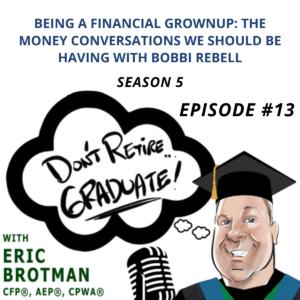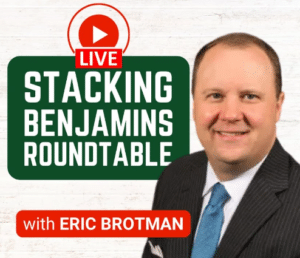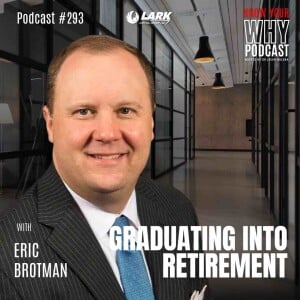Welcome back to Don’t Retire… Graduate! Today’s guest is Bobbi Rebell is fellow University of Pennsylvania alum and is here for a reunion to talk about topics that we’re all thinking about (at least, we money nerds are): financial wellness, student loans, stress, and how to prepare the next generation for the future.
Bobbi is the host of the Money Tips for Financial Grownups and author of her new book, Launching Financial Grownups: Live Your Richest Life by Helping Your (Almost) Adult Kids Become Everyday Money Smart, and a financial wellness advocate. Listen to her share her story and then go check out her podcast (specifically, Eric’s episode of course).
In this episode we’ll talk about:
• Bobbi’s background and how she became a journalist, CFP®, writer, and financial
• Financial influencers, the finance media, and how dangerous it can be to talk about money when you don’t have credentials
• Bobbi’s book, Launching Financial Grownups, and how it came to be
• The change from helicopter parenting to concierge
• The student loan crisis and how to get young adults to understand the impact
• Negotiating merit scholarships and financial aid for college
• Financial Wellness Strategies
• Financial stress in the workplace and how it affects a company
• Getting the next generation ready to inherit wealth and take over financial decision making
[00:05:05]Bobbi Rebell:And when I did that, what was interesting, Eric, is when I started doing speaking engagements and talking to groups, they were asking me very specific questions about what they should do with their money. And I’m “just a journalist”, I had interviewed experts. And I decided, well, if I’m gonna get out there and talk about money and talking about money when you don’t know what you’re talking about, I love so many financial influences, many are my-financial influencers-I should say.Many are my dear friends, but money is dangerous. If you are talking about money to people and you don’t know your stuff. It is so dangerous and can really ruin people if you give them incorrect information. And I’ve seen it with financial influencers that don’t have credentials.[00:05:44]Bobbi Rebell:So I decided if I’m gonna be out there, I’m, and I’m gonna write more books and I’m gonna do more speaking, and whether I like it or not, people are gonna take what I say as advice. I better know my stuff.So I actually then became, a certified financial planner-only in 2017. [00:06:00]So, and I remember you were asking me and, and you keep up your credential. I’m like, yes. [00:06:03]Bobbi Rebell:And I love doing continuing education cuz I’m a super nerd. So I love learning about the different products that are evolving, the way that the laws are changing, the way that–it’s always fascinating how different things that the government does is sortof secretly aimed at changing our behavior, right? Or adjusting, reacting to things that we’re doing. [00:06:22]Eric Brotman:Yeah. [00:06:22]Bobbi Rebell:So I’m fascinated by it all. [00:06:24]Eric Brotman:Well, not even secretly. Overtly [00:06:26]Bobbi Rebell:Overtly. [00:06:26]Eric Brotman:Alright, so, oh, so you, you’ve, you’ve thrown a lot out at, at me and I, I wanna sort of digest this in pieces because first of all, I consider most financial media to be sort of financial porn. You know, and watching, watching some of those shows and, and I, I’ll pick on CNBC. [00:06:43]Bobbi Rebell:Yeah. [00:06:43]Eric Brotman:But, but simply because watching that is so unhealthy for you and most of it doesn’t matter to you at all. And there’s a great deal of difference between personal finance for Main Street and financial talking head wonks for Wall Street, and they are not the same.[00:06:58]Eric Brotman:And arguably we could argue that the, the [00:07:00]game is rigged against the average individual. Not to go conspiracy theory or anything,but we, we could do that. I love the fact that you’ve taken the approach that if I’m going to be an influencer, I’m going to know what I’m talking about because I happen to think that most of the biggest influencers in our space I agree with you, most of ’em don’t.[00:07:17]Eric Brotman:They’re very entertaining. They sell a lot of advertising. People want their their t-shirt, but they’re not necessarily dispensing anything other than entertainment. And when you start talking about personal finance, people assume it’s going to be boring. I’m a fellow money nerd. I took business statistics at Wharton as an elective and don’t know why I put myself through that in retrospect, but at the time it seemed like a good idea.[00:07:40]Eric Brotman:And, you know, I, I love the way that that money works and I love to help people figure it out because there-it is nuanced and it is important. So, so let’s talk a little bit about your, your book and then I know you’ve started a brand new financial wellness organization, a company that is literally launching.[00:07:56]Eric Brotman:It’s, it’s not every day I get breaking news, but this feels like breaking news, [00:08:00]so we’re gonna talk about that too. But, but first the book, because it, it is set up in a way that is extremely accessible and absolutely in my, in my opinion, it’s very authentic. It’s an easy read. It is a an informative read.[00:08:17]Eric Brotman:There’s nothing boring about it. You used a sense of humor that, that, that, and, and you quotedsome folks, and I love the, the quote from our, our mutual acquaintance friend Jean Chatzky, when she said something about her, her, her son said, “you know what I love is making money and what I don’t love is paying taxes”.[00:08:33]Eric Brotman:And it’s like, well, welcome to adulting. Just great stuff. So, [00:08:36]Bobbi Rebell:Yeah.[00:08:37]Eric Brotman:You, you, you have all kinds of, of popular references in here, references to, to well-known people, references to movies, references to to life that makes this so accessible. How, how did you get the idea to structure the book this way?[00:08:53]Eric Brotman:Because it does feel like a sort of mini curriculum. Which is with, which is something that our audience is highly familiar with because it’s the [00:09:00]way that I try to communicate. How did you decide to do it that way? [00:09:03]Bobbi Rebell:So I have to give credit to my book agent. It originally was not scheduled. It wasn’t that way. And that was actually her idea. Full disclosure. [00:09:11]Bobbi Rebell:The concept for the book was actually, yeah, she had that idea. And then, then that’s how we did it that way. And we had electives and we had, we, I don’t know that we did extra credit. I forget. I don’t think, we do have,definitely have electives and graduate studies. [00:09:24]Eric Brotman:No, but you did exmissions.[00:09:24]Bobbi Rebell:You do four years of college. We do exmissions. You did four years of college. Mine is prerequisite. Then the core curriculum, extracurriculars, and then graduate and, and then exmissions. So it’s a little bit different. The book was actually inspired by, I have a blended family and I have stepchildren that are now adults.[00:09:43]Bobbi Rebell:At the time they were almost adults when this was written cuz we know the books have sort of a long cycle…. [00:09:48]Eric Brotman:They do, yeah.[00:09:48]Bobbi Rebell:and they were good kids. They were earning money. They were showing up for all the things they’re supposed to be doing. And yet when I tried to talk to them specifically about the everyday money [00:10:00]task that you have to do it as adults, I was justkind of getting, “yeah, yeah”. I tried to get them to set up a Roth IRA. They always said “yes!” and then it just didn’t happen. And I said, “I can’t be the only one having this problem. And I know more about money than most people. So if I’m having trouble, maybe other people are too”. And that in fact was the case when I sort of, you know, soft tried to sort of soft sell it to people and said, you know, what do you think about this concept?
[00:10:23]Bobbi Rebell:That we have sort of, you know, done, done our young kids a, a disservice, our young adults a disservice because we’ve moved from helicopter parents to concierge parents where we’re sort of there to, you know, be available to solve their problems at all hours, often with money. And so they don’t really feel this urgency to do the things that we were doing.[00:10:44]Bobbi Rebell:I know you talk a lot about growing up as a Gen Xer and how we were sort of left on our own. But the good thing about that is we sort of decided to be self-sufficient.We figured things out, we made mistakes, but they got done. The fact is we have gone the other direction and we have [00:11:00]really overly helped our young people to the point where they kind of know we’re gonna be there for them and we are.[00:11:06]Bobbi Rebell:So they’re not necessarily doing the things they need to do. So it’s really important to empower them, not just give them the information, but also let them know that they’re competent. It took a lot to finally get the kids to do the Roth IRAs, and it’s actually complicated. One did, one didn’t, which is a kind of a a tease to the book is why one didn’t, and she made the argument to me why she shouldn’t and why she did, did things differently, but it was interesting. And the book has a lot ofparenting experts and financial therapists in addition to money experts like Jean Chasky that you mentioned. And David Bach wrote the foreward, which I’m so proud of. He’s amazing. Anyone that hasn’t read David Bach’s books should absolutely do so. [00:11:47]Eric Brotman:There, there’s, there was a, a, a statistic in the book that said something like 79% of of adults in this country are helping their adult or grown children [00:12:00]financially in some way. 79%! Which does mean we, we… [00:12:03]Bobbi Rebell:yeah, 28% would hit up their retirement accounts.[00:12:06]Eric Brotman:Oh man. I mean, I, I’ve seen, we, we’ve seen lots of folks who spend so much money on their kids’ education that they can’t in fact retire with dignity themselves. And you know, you do tend to, we all wanna put our kids first, and this is one of those areas where it’s really a mistake in most circumstances.[00:12:24]Eric Brotman:But, but I, you know, the, the movie reference that I go to is, is Billy Madison, you know, the Adam Sandler movie where he, he has so much money that he sits by the pool all day and does nothing. And, and of course, the movie’s not for all ages, so don’t go out and watch that with your kids. But, but nonetheless, it’s, it’s, you can ruin your kids with money and, and doing the right legal and trust and estate planning, doing the right philanthropy, teaching your kids the value of money is so important and it’s so complicated-partly because most adults don’t know it well enough to teach it, much less to even exhibit the behavior. [00:13:00]How, where, where does this begin? Because financial literacy education in schools really isn’t happening and where it is happening, it’s sort of done halfway. It’s not great. How do we teach people about something this complicated and this important?[00:13:15]Bobbi Rebell:Well, you, you point out all the most important things, and what’s been interesting is after a book comes out, people come up to you and they start confessing to you and telling you things that they wouldn’t tell anybody else. And so many parents have come up to me and said, “but I don’t know enough about money to teach my kids”.[00:13:30]Bobbi Rebell:And my answer is: you are the stakeholder. You gotta get it together, right. Because at the end of the day, even if the schools were doing a, a good job, which in most casesthey are not, ultimately the schools, no matter how well intentioned are not stakeholders in your family’s future. And the best gift you can give your kids is your own financial independence later in life.[00:13:51]Bobbi Rebell:They can figure it out. They can get themselves outta debt, they can get loans, they’ll get jobs, they’ll earn more-they’ll get it together. But if they have to support you, [00:14:00]you’re never gonna get over that. So that’s really the ultimate gift. And what I tell parents is that being the ultimate stakeholder, you need to step up, take responsibility, and guide your child through what they need to know to set them up. It’s not just about competence, it’s also confidence. Let them know that you believe in them. Be there. Ifthey come to you with a financial problem, don’t say, “here’s the solution”. Say, “let’s brainstorm. What kinds of things could you do to find a path forward?” [00:14:27]Eric Brotman:Let’s talk about student loans a little bit, because of all-you talked about the government, it’s certainly a hot button issue of “are, are these gonna be paid off for folks and so forth”.[00:14:38]Eric Brotman:But, but let’s go back to the point where you have a 17, 18 year old young person. I, I won’t say kid, but I, I can’t say adult either. So let’s go with young person. And they’re making huge financial decisions-often in a vacuum-without understanding the, the, the ramifications of those decisions with almost no, no guidance.
[00:14:59]Eric Brotman:And they’re [00:15:00]being offered loans that five years later a bank would laugh at them if they came for a loan to start a business. But if they want to go get a, a liberal arts degree-here, have all the money you want. It is a bizarre thing to me that, that, that continues-where do we, how do we fix student loans?[00:15:18]Eric Brotman:And, and, and how do we get kids to think about what it means to be a hundred grand or more in the hole when you start your financial journey? Because that’s, it’s like building a skyscraper and starting with, with something subterranean. [00:15:33]Bobbi Rebell:Yeah. It’s, this is something that I think is really weighing on young people and really, taking the focus away from what they should be focusing on, which is starting their lives with a clean slate.[00:15:43]Bobbi Rebell:So I think it’s important for parents to communicate to their children what they’re taking on. Maybe open the kimono a little and say, “look, we are not gonna be able, you know, here’s what we can do. Here’s what we cannot do, and let’s make the smart choice”. I also think it’s important to, you know, have some systemic changes in the way that [00:16:00]we finance education-many countries do it differently. So that is something. Another thing that’s that’s been happening, which I think is interesting is corporate America, there’s new legislation happening where we can allow kids that are paying off their student loans to also have their company match that in terms of retirement.[00:16:16]Bobbi Rebell:So we don’t have the situation as they move forward where they’re so busy paying off this debt that they’re also delaying saving for retirement. So that’s actually a little bit of progress. That’s gonna be a couple years, I think before that kicks in. You probably know better than I do, but it’s important to open their eyes, let them understand what’s going on, let them understand that whether they feel like adults or not, this is a very grown up decision and to tread carefully and make the best choices.[00:16:41]Bobbi Rebell:I mean, a lot of schools will give merit scholarships. There’s one of the people in my book, I don’t know if you’ve gotten to this point yet, is Ron Lieber and he wrote a book called The Price You Pay for College. And I highly recommend it because what it does is it shows us that the price we pay for college is notonly tied to need-based financial aid in terms of [00:17:00]grants and loans, it’s also tied to how much the school wants your kid. So this is a bit of a puzzle for many parents, but you can actually go to schools and say, “well, my kid, we may not qualify for traditional student aid, but my kid would be a great asset to your school. He’s got other choices, she’s got other choices, whatever it may be. What can you do for us? Can you work with us?” Because there are, they call them merit scholarships, but the truth is I think they’re kind of like marketing budgets for these schools because they want the best and brightest kids to come to their schools. And so this is a tool that many schools are using to recruit and retain and get higher yield rates. Is that, I’m not sure I phrased that correctly. And that’s something that parents should be very savvy about and really used to their benefit. Do you know much about that?[00:17:43]Eric Brotman:Well parents have–Well, parents have been shopping financial aid offers for, for a long time, saying the school–[00:17:47]Bobbi Rebell:Right, but this is different.[00:17:49]Eric Brotman:I know it is. [00:17:49]Bobbi Rebell:This is not financial aid. Yeah.[00:17:50]Eric Brotman:Correct. So on the financial aid side, it’s, “Hey, school B offered us this and school A, we’d like to come here, but you need to match the offer.” This is along the lines of saying, [00:18:00]this is what we’re willing to, this is what we’re willing to spend, and you’re gonna want this deal.[00:18:05]Eric Brotman:It’s almost, it’s almost putting the shoe on the other foot. And some schools have acceptance rates at 80 and 90%, I mean, at some point is, is, is, are, is your building on fire? I, I hear, I hear sirens at you’re building. You’re in New York City, aren’t you? [00:18:20]Bobbi Rebell:Oh, I am in New York City. Yes, there are, there are fire si, sirens outside.[00:18:25]Eric Brotman:That’s fine. No, that’s–[00:18:25]Bobbi Rebell:We can cut, cut that out maybe. But welcome to New York City. [00:18:28]Eric Brotman:That’s the cacophony of, we can leave it in of Manhattan. We can leave it right there. So, so, but you talk about how you can negotiate. And you can negotiate for, for education for your kids, particularly if they’re strong students and if they’ve done some things.
[00:18:42]Eric Brotman:You know, when, when you and I were applying to schools, it was important to be involved in everything. It was about having diverse resumes, and so we would have, we’d be in 10 clubs or 10 hobbies. Today, it’s about being really great and really uniquely awesome at one thing. Which is a very different [00:19:00]model now for kids.[00:19:00]Eric Brotman:In fact, we’ve done, I I, I was on a show recently about college savings and specifically how to get kids into schools. And it, it, the, the game has changed from when we were, from when it was our turn I don’t know wanna say how long ago, but a long time ago. So there’s that. You also mentioned the, the saving for retirement while paying student loans.[00:19:18]Eric Brotman:Some companies have been offering that for a number of years. It’s now gonna be part-under Secure Act 2.0-it’s now gonna be part of the deal across the board. But there have been employers who have been doing that for a number of years, where they were allowed to essentially make the matching contribution to a 401k or a similar plan for an employee.[00:19:37]Eric Brotman:If that employee demonstrated that the amount they were paying in student loans was a large enough percentage of their gross income for the course of the year, so they had to demonstrate number one, that, that that was the payment requirement, and number two, that they made the payments, but then the match would happen, so at least they would still get something.[00:19:53]Eric Brotman:In their retirement plans. So let’s shift gears. You have a brand new venture happening and I, I know we [00:20:00]havethe, the first screenshot of the website. I don’t know that anyone’s seen this yet, or if they have it’s been, it’s been your, your test group. So this is, this is great. I love-[00:20:08]Bobbi Rebell:Yes. [00:20:08]Eric Brotman:Everything, everything about this site makes me think financial therapy.[00:20:12]Eric Brotman:And I, I don’t know that, that, so, so just, it makes me feel comfortable. It makes me feel, feel good. And then workplace financial wellness and, and generational wealth retention are two things that we spend an enormous amount of time on here as a firm and in working with, with corporate clients and with their employees.
[00:20:28]Eric Brotman:So where did this business concept come from and, and give us asneak peek as to what’s coming. [00:20:34]Bobbi Rebell:Yeah, so this came from the book being out there and talking to so many people about what is important to them and what’s missing, right? Because they feel lectured to very often that they have this to-do list.[00:20:47]Bobbi Rebell:It’s very stressful. You have to do this, this, and this, and they don’t know where things are. And you know, very well-intentioned people in human resources have automated many things, which is great, but they’re just kind of sent a link and then they don’t [00:21:00]know what to do, when to do it, and most importantly, how to not just feel completely overwhelmed and then not do it.[00:21:07]Bobbi Rebell:Add to that, people come up to me, they’re so worried about all the layoffs happening. They’re worried about they, you know, we just talked about secure Act 2.0. What does that mean? I don’t understand it. And they want a human to talk to. So it’s, it’s set up to be a high touch experience where I go into companies, and I talk and work with employees-this is the workplace wellness-about, how to manage their life. Not just going through the checklist, but how to, you know, what are your coping skills while this is going on, because you, you’re showing some, some wehave in the screen recording, you’re showing some statistics, but the majority of employees feel stressed about money at work. That’s a PWC statistic, so how do you maintain productivity? Well, you’ve gotta figure out-[00:21:47]Eric Brotman:right.[00:21:47]Bobbi Rebell:If they’re distracted, they’re not productive. So we’ve gotta figure out, they may have debt that’s not gonna be paid off for years. Let’s say in the scenario we’re talking about, they’re, they have student debt, they’re stressed out.[00:21:57]Bobbi Rebell:Okay, number one, we have to actually take action [00:22:00]and teach them, let’s set up a payment program so you can say, “yes, it’s gonna take you this amount of time to pay it, but it will be done”. And all you have to do is nothing. Just keep the automation, and it will be paid off, right? You feel better already.[00:22:11]Bobbi Rebell:And then what are the coping skills that we can use so that you can sleep at night? Is it a meditation app? Is it just having more knowledgeabout, about interest rates and how things work? I mean, we’ve joked about being money nerds. I feel a lot of calm when I understand what’s going on with my money when I understand how different things work and why something is happening, right? So understanding the consequences and the benefits of the action that you’re taking. And then the separate part, the generational wealth retention-that really came more directly from the book because people have come up to me and said, “I’m interested, but my kidsjust aren’t, how do I get them interested?”[00:22:47]Bobbi Rebell:And then the wealth advisors say, “I’ve got these clients, they’re great clients, but I can’t seem to connect with the next generation.” In many cases, I, it, it is true that sometimes the younger generation isn’t interested, but I’ll [00:23:00]tell you what’s coming out is the parents, they think they are inviting the kids along, but they’re not, they’re not really making the kids feel like “this is your future”. You may have to take care of me one day, by the way. Including taking care of my finances. You need to be proactively involved in understanding what’s going on with money. Even if you are not the primary right now, I need you to come to the meetings. Let’s say maybe you don’t have to come to the monthly meetings, maybe come to the quarterly meetings.[00:23:26]Bobbi Rebell:I want you to have the direct phone number to my financial advisors. I want you to get the statements too so that you understand what is going on. And by theway, this is something that my own father did for his children. He said, I, this is where my resources are and I need you to know the money managers and I, you don’t have to come every time, but you’re gonna come some of the time.[00:23:44]Bobbi Rebell:And I’m gonna discuss it with you, even though you may not, you know, part of me goes, no, no, no, no, no, no, no. I don’t wanna hear anything about any future, you know, that doesn’t involve my entire family. I’m don’t wanna cry, but. It’s hard. It’s really hard and it’s emotional, and [00:24:00]sometimes the wealth manager doesn’t wanna necessarily have these conversations or can’t make headway with the older generation because they want control or they don’t think the kids are ready.[00:24:09]Bobbi Rebell:But the kids have to be ready to some extent, even if ready just means knowing who to call. And knowing that it’s, that something’s there for them, and I think there’s a huge role for financial advisors in this. I think this is the perfect area for a third party. One of the interesting statistics that people will find on my website, which is right now evolving still, but we’ve got the basics up there, so it’s financialwellnessstrategies.com. You will see that 50% of the next generation is willing and open to working with their parents’ financial advisors, but only 20% have ever met them. What a missed opportunity for both sides, right? We’ve gotta get those meetings started. We’ve gotta figure out why in many cases the parents are resisting andwhy the kids are not more motivated to understand the importance of, of just being in the loop and educating [00:25:00]themselves, and that ultimately it’s not optional. People think, “oh, I’ll just let them take care of it”. You got to-at the very least-know what’s going on. You don’t have to get into the, you know, the absolute granular everything. You’ve got competent third party financial advisors that are gonna do that. But you need to take the time and force yourself to be walked through the key elements and understand so that you’re all on the same page.[00:25:22]Eric Brotman:So, so Bobbi, both of these areas are things that we, we share a passion for both of them. It’s, it’s kind of a remarkable thing to have this sort of in my face because it’s things that I’ve been preaching and talking about. So the corporate financial wellness, we have landing pages around that and specifically have done this for, for companies.[00:25:40]Eric Brotman:And what we find is that companies don’t want their employees distracted. They do want them to have some-[00:25:46]Bobbi Rebell:Right. [00:25:46]Eric Brotman:-calmness that you can’t get it from HR. In fact, HR in a lot of cases, it’s not legal for them to advise you on anything. All they can do is point you to the right link or the right resource, which is only so helpful to your point. I remember I got my first job out of out of [00:26:00]Penn at Lake Mason and got handed the employee benefit book and immediately did what most young people. Put it off to the side and then said, “oh, I got a deadline”. And then talked to my father who gave me horrendous advice about what to choose cuz it would’ve been right for him, but not for me.[00:26:12]Eric Brotman:And I, I don’t blame him for that. It, it, he wasn’t equipped for that discussion. So but, but on this side, when we meet with employees, it’s unbelievable how many don’t understand, for example, the basics of an HSA or the basics of how a 401k or Roth 401k can, can impact them. Or they don’t have beneficiaries named on anything or don’t have basic legal documents or just are or are, are making decisions largely unarmed and in a vacuum.[00:26:38]Eric Brotman:And so it’s become very, very helpful to the employees-and the employers love it-because it means that they’re getting someone to advise them. So I, I love that you’re, that you’re making a push toward that. And then the, the other piece of that is the multi-generational, you know, firms like to say that they do multi-generational planning.[00:26:54]Eric Brotman:One of the deliverables that we give every client is a family tree and we have a legacy client program and [00:27:00]a lot of our clients actually pay initially to have their kids get financial plans and they work with someone other than a senior principal, cuz I don’t know about you, but I didn’t want my, my parents’ advisors.[00:27:11]Eric Brotman:But I loved building relationship with my own advisor at that same firm. You know, using the younger associate at the law firm or using the younger accountant at the accounting. You know, we have, we have millennial and Gen Z planners here who speak millennial and Gen Z. I’m the old guy. They don’t want me, you know, and p and, and, and by the way, I don’t want my parents’ doctor either.[00:27:32]Eric Brotman:Like, you want somebody who’s gonna be around A), you speak the same language, you’ve had some common experiences, and B), you want them to be around when you have to make some of the big decisions. And if your advisor’s 30 years older than you, it’s a problem, cuz they’re not gonna be there-they’ll either be retired or deceased.[00:27:47]Eric Brotman:You’re, you’re much better off working with a contemporary who, who can identify with you. So you’re, you’re absolutely-as far as I’m concerned, your, your new venture is, is hitting all the right notes, both for the [00:28:00]financial advisory community and for corporate America and employees. And I, I give you incredible kudos for, for tackling two really important subjects simultaneously while, while still keeping your day job and still doing all of the, all of the things that you’re doing.[00:28:15]Eric Brotman:Cuz I, you know, I, I had the, the privilege of being a guest on your show recently. The, the, the things that you’re doing just below my mind, like I, I, so, so I know, I know you, it was a career goal to be on Don’t Retire, Graduate. Well, I tell you, it’s, it’s mutual. The respect is fully mutual. And so it was, it was great to be on, on your show too.[00:28:34]Eric Brotman:So I have to ask you now, because we’re, we’re at that time–what you want to be when you grow up, and I can’t wait to hear this, this, I’m, I’m gonna just pass the popcorn. I’ll be right here.
[00:30:24]Bobbi Rebell:Yeah. [00:30:25]Eric Brotman:You know what I mean? Like, it just doesn’t resonate because you didn’t live through it. And so, and the next generation will not believe that Covid happened-at least let’s hope-in the way that it did. [00:30:35]Bobbi Rebell:Wow. [00:30:35]Eric Brotman:Let’s hope that’s not, but, but you know, the fact that my daughter spent-[00:30:39]Bobbi Rebell:Yeah. [00:30:39]Eric Brotman:-and our kids spenttwo years mostly online and having a totally different experience than–the fact that some college kids spent a year or two not being able to have that experience or seniors miss their proms or their senior seasons or whatever it is.[00:30:54]Eric Brotman:It’s, it stinks. But it’s also a story that will be told for [00:31:00]generations that will sound like, “how did that happen? Like, what do you mean?” So, I love your, I love your grownup plan, and I suspect it’s one of many. I suspect that you willtackle that one. So, so I wanna know for sure what the extra credit assignment is.[00:31:15]Eric Brotman:And, and I, I think first of all, if, if people don’t, don’t get this book, they’re making a mistake because I already love it and I can’t wait to,first of all, it, it arrived unsigned-which is very hurtful. I thought they would’ve been, I thought I, you know, I was willing to pay a premium for your autograph and everything else, but no, it’s, it’s wonderful.[00:31:31]Eric Brotman:So I hope folks will do that. But what other extra credit assignment is out there for folks who can take one nugget of, of wisdom or advice from today’s talk? [00:31:40]Bobbi Rebell:I think people should continue to educate themselves and to educate everyone that they care about, especially the financial stakeholders in their lives, about money.[00:31:48]Bobbi Rebell:And one way, one great way to do it, by the way, is by listening to podcasts like ours. I think that’s really important. You mentioned that a lot of you know the stuff on CNBC, which is, is sure, watch CNBC if you want, but for your real financial [00:32:00]advice, think
[00:35:36] Eric Brotman: For now, this is your host, Eric Brotman, reminding you: don’t retire, graduate!
About Bobbi Rebell:
Bobbi Rebell, CFP® is the founder of Financial Wellness Strategies and the author of Launching Financial Grownups: Live Your Richest Life by Helping Your (Almost) Adult Kids Become Everyday Money Smart. She is a financial wellness advocate, the host of the Money Tips for Financial Grownups podcast and the founder of GrownupGear.com. Bobbi was previously a global business news anchor and personal finance columnist at Reuters and held various journalist positions at top news outlets including CNBC, CNN and PBS.
Guest Resources:







